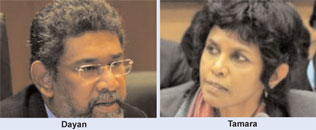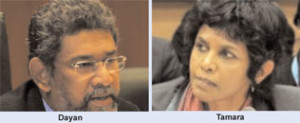Destroying the President’s defenders by Rajiva Wijesinha
Sri Lanka is full of conspiracy theories. There are many reasons for this, not least the fact that theorising about conspiracies is a universal practice, and we in Sri Lanka are victims of this as well as practitioners.
Then there is the fact that conspiracy theories are fun. Since they necessarily assume that evidence must be shadowy, they allow those with vivid imaginations to pursue their pet agendas under the guise of creative thinking. And since the conspiracies one discovers are the responsibility of others, one can promote one’s own conspiratorial efforts in the belief that they are mere reactions.
However, we must also remember that even if we, like perhaps all other nations, are paranoid in considering our own interests, that does not mean that others are not out to get us – or, rather, all others, like ourselves, want to pursue their own interests, and do not mind if we or anyone else goes to the wall in the process. This is obvious on first principles, as Thucydides so succinctly put it over two thousand years ago. And as was the case when Thucydides wrote, all nations try to conceal their pursuit of self interest by claiming that they are acting on principle. Where this is obviously not the case, the claim is that the other breached principles first.
This is not necessarily hypocritical. As that great analyst noted, there are consummate hypocrites around, and unfortunately they tend to exercise disproportionate power. But actual leaders are more often than not the victims of their fantasies about their own morality. Thus everyone knows that Barack Obama has been as forceful as his predecessors in using any means he thinks necessary to pursue the interests of his country, and the rhetoric he uses has accordingly changed. But there seems nevertheless a sincerity about his pronouncements that suggests he thinks he is as idealistic as before.
About some of Obama’s advisers I have my doubts. But I see no reason to believe that they are acting against American interests. In Sri Lanka, sadly, the same cannot be said about the President’s advisers. What some of them have managed to do in the last couple of years is to actually strip the President of his defences so that day by day he becomes more vulnerable to attacks.
Tamara
This became clear to me when I heard about the latest efforts of our Ministry of External Affairs to persecute Tamara Kunanayagam. They are now trying to make her pay for the transport of her goods from Geneva where she served as our envoy. This is because they announced her appointment to Cuba before she had agreed. They then subverted the agreement the President had made with her when he persuaded her to accept the appointment with additional responsibilities. They then tried to drive her into going to Cuba so that she could be deprived of the opportunity of presenting the Report of the UN Working Group on the Right to Development, which she had been selected to chair. And now that she wishes to go to Cuba as a private citizen, they are insisting on sending her property to a residence in Switzerland they imagine she owns, though she has made it clear she gave up her Swiss residence rights when she first acceded to the President’s request to serve her as an envoy, in Brazil.
Ironically, I learnt about all this just as Navi Pillay’s draft report was publicised. That is a subtle document, which is perhaps the first nail in the coffin that has long been in preparation for this government. The Ministry of External Affairs has responded, and this is a better effort than the diatribe which Navi Pillay received last month. But reading through it, I remembered how we used to deal with the lady in the old days, trying to understand the genuine concerns in areas where we could be doing better, while responding clearly to fallacies that we felt had been fed to her.
In those days we had Dayan Jayatilleka, and even his worst detractors who are supportive of the government grant he did a fantastic job in building up a coalition of solid support for Sri Lanka, while parrying every thrust, through the teams he deployed. While Minister Mahinda Samarasinghe led the regular delegation, Dayan also made arrangements for individuals like Prof Peiris and Prof. Vitharna to meet different audiences, so that all concerns could be addressed.
Tamara did not have the same freedom of action when she was called in to remedy the situation but her knowledge of the UN system, and the excellent rapport she developed with her counterparts, made her very effective. The last letter she sent Navi Pillay, which the Ministry of External Affairs basically denounced, shows what in intelligent and consistent diplomat could achieve. I hasten to add that the present incumbent is also very able. But as a career diplomat he is under the control of a dispensation in Colombo that will ensure he fails.
Dayan
For that, I fear, is the game now. There is no other explanation of the fact that Dayan was got rid of just when it became clear that diplomacy was even more important than before. The Security Forces had done a superb job and, though Dayan’s service in fending off resolutions in Geneva before they had eliminated terrorism from our shores was vital, it was that elimination that was the main requirement. But when the post conflict resolution made it clear that a witch hunt was on, surely any sane government would have realized that Dayan was even more essential?
Perhaps he was the victim of his own success. The massive majority he secured for the resolution he put forward at the Special Session may have made the idiots in Colombo think that any idiot could win a diplomatic victory. And so they sacked him, and no one with Executive Office bothered to even speak to him when he came back. When he mentioned this to the President, who did summon him when no one else did, he was told laconically that they could hardly do that after the way they had treated him.
The President, having first offered him Japan, then sent him to Paris, where he did an excellent job, though adverse reports were sent back about him talking to Tigers – unfortunately he seems to have been the only envoy who did what the LLRC notes is necessary, discussion with the diaspora, which our Ministry of External Affairs is still not doing systematically. I should note though that junior members of the diplomatic service did their best, though they were got rid of for their pains, which happened to both Deputy High Commissioner Amza in London and Deputy High Commissioner Krishnamoorthy in Chennai (though the brilliance of both seems now to have been recognized, even though characteristically Mr Krishnamoorthy is being sent to a station where his particular gifts cannot be exercised).
Even in Paris however Dayan was persecuted by the Ministry, and though the President assured him he would not be dismissed, it was clear that he was not wanted. Sadly, now that his term is up, without him having requested an extension, Paris remains empty. He himself is not apparently of the view, which he puts with a skill in intelligent English that no government spokesman can rival that, though the President is still the best person to lead the country, the team he has is so appalling that some sort of change is essential.
Meanwhile Tamara also was sacked from Geneva, even though all observers not belonging to or sent by the Ministry thought she was the best thing we had there – including Lord Naseby, one of our staunchest supporters in Britain. Ironically, in the struggle between Ministers Samarasinghe and Peiris, she was firmly on the side of the latter, but it is the Foreign Ministry that disposed of her so ruthlessly. Similarly, I should note that Dayan was one of those who persuaded me at the time that Prof Peiris would make a better Foreign Minister than Mahinda Samarasinghe, which I agreed with then, though I realize now that I was wrong (Dayan still thinks he was right, having greater reliance on intellect than I do, but grants that this says little about actual suitability).
This problem has been going on for a long time, and is perhaps best summed up in the comment by Mangala Samaraweera, who flatteringly told me that he held Dayan and me responsible for the ills of the country. I asked for an explanation, and he said that what we had achieved in Geneva had led to the government thinking it had licence to do whatever it liked.
I do not think he was correct, though certainly there has been much less circumspection since. But we should also think about the constraints that Mangala would have liked applied to government. We need constraints, but they should come through the Constitution. Since our Constitution is inadequate and inconsistent there is need of a comprehensive review and reform. But because we ignore our own minor problems, we will soon be subject to greater ones, in the form of the constraints and controls that others wish to impose. These will soon be upon us unless the changes this country needs at the Ministry of External Affairs occur soon.
IS

